
Silver Lake overcame doubters to secure Alibaba deal – AVCJ Forum
Silver Lake’s 2.2% stake in Alibaba Group is worth more than $6 billion at current market prices, but internal approval for the original investment in the Chinese e-commerce player in 2011 did not come easily.
The technology-focused private equity firm describes its investment approach as disciplined, valuation sensitive and control-oriented. Alibaba set two records: the highest valuation Silver Lake had ever paid for a deal in absolute terms and multiple terms; and the lowest percentage ownership.
"Alibaba was at the far end of an extreme for us format-wise," Kenneth Hao, managing partner and managing director at Silver Lake, told the AVCJ Forum. "I remember one of my colleagues on the investment committee saying, ‘So your base case is an IPO with a $100 billion valuation. How many times has that happened before?' At the time the answer was zero. It seems quite conservative now."
At one point the uncertainty looked set to limit the private equity firm's investment in Alibaba to $100-200 million, but it ended up committing more than that - reportedly $300 million, as part of a consortium that paid $2 billion for a 5.7% stake - and brought in two LPs as well.
Alibaba went public in the US earlier this year, raising $25 billion in the largest IPO ever seen globally. Silver Lake took $278.8 million off the table as part of the offering. Its remaining 2.2% was worth $3.7 billion based on the IPO price of $68 per share, but Alibaba's stock opened at $92.70 and has since gained an additional 25%.
In 2011, however, it wasn't only the mismatch with Silver Lake's typical transaction that was causing doubts. Alibaba was not well understood - it had a Hong Kong-listed B2B subsidiary while the now more valuable B2C and C2C-related assets remained in private ownership - and the company had just spun out its Alipay payments business, briefly causing tensions with major shareholders Yahoo and SoftBank.
On top of all this, the transaction presented to Silver Lake was unusual: it was an entirely secondary offering, creating liquidity for employee shareholders and a number of early investors. "From our investment committee's standpoint, that was buying shares from company insiders," Hao said.
Joseph Tsai, executive vice-chairman at Alibaba, admitted that "most people would view that scenario as toxic."
But the deal was underpinned by an established, three-year-old relationship between the two parties. Tsai noted that given the size of the transaction and the need for technology expertise, few PE investors were equipped to take on the deal. And Alibaba saw value in getting Silver Lake's stamp of approval.
"The transaction was unusual. To have Silver Lake come in and say we have kicked the tires and looked under the hood and it's a good company - that was a great validation of the company," said Tsai.
The private equity firm drew additional comfort from the fact that it was able to conduct meaningful due diligence. Hao contrasted the leaps of faith required for some technology companies that have lots of traffic and no business model, with the "commercial intent" apparent in the Alibaba approach.
"We could take a look at ROI and where and how an advertiser could get a return for bidding on a particular set of ad words," he said.
There was also confidence both the China consumer growth story - there are approximately 600 million internet users in the country but only half are currently online shoppers - and Alibaba's ability to take advantage of the wave of mobile-driven e-commerce business.
Tsai noted that in the 12 months ended September, the company generated $95 billion in gross merchandise volume (GMV) via mobile devices. This is accounted for 36% of overall GMV, compared to just 14% the previous year.
Latest News
Asian GPs slow implementation of ESG policies - survey
Asia-based private equity firms are assigning more dedicated resources to environment, social, and governance (ESG) programmes, but policy changes have slowed in the past 12 months, in part due to concerns raised internally and by LPs, according to a...
Singapore fintech start-up LXA gets $10m seed round
New Enterprise Associates (NEA) has led a USD 10m seed round for Singapore’s LXA, a financial technology start-up launched by a former Asia senior executive at The Blackstone Group.
India's InCred announces $60m round, claims unicorn status
Indian non-bank lender InCred Financial Services said it has received INR 5bn (USD 60m) at a valuation of at least USD 1bn from unnamed investors including “a global private equity fund.”
Insight leads $50m round for Australia's Roller
Insight Partners has led a USD 50m round for Australia’s Roller, a venue management software provider specializing in family fun parks.






